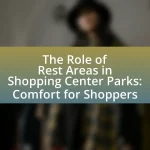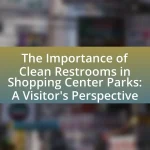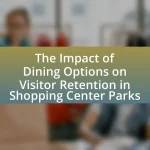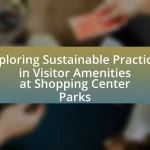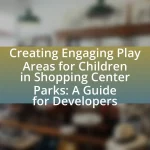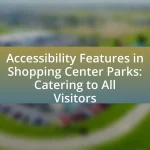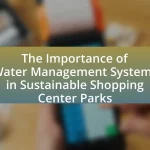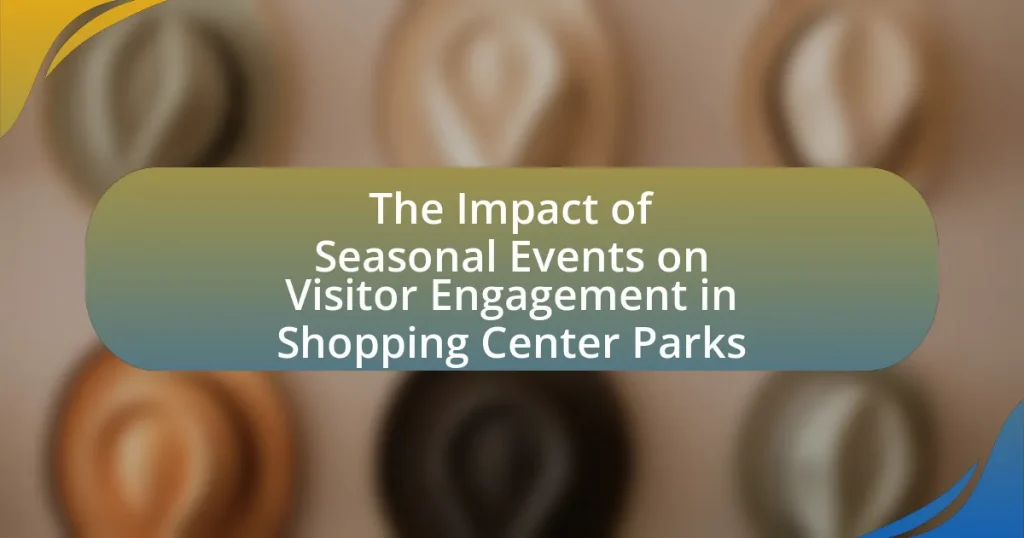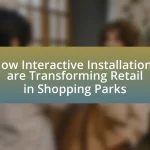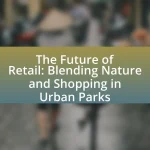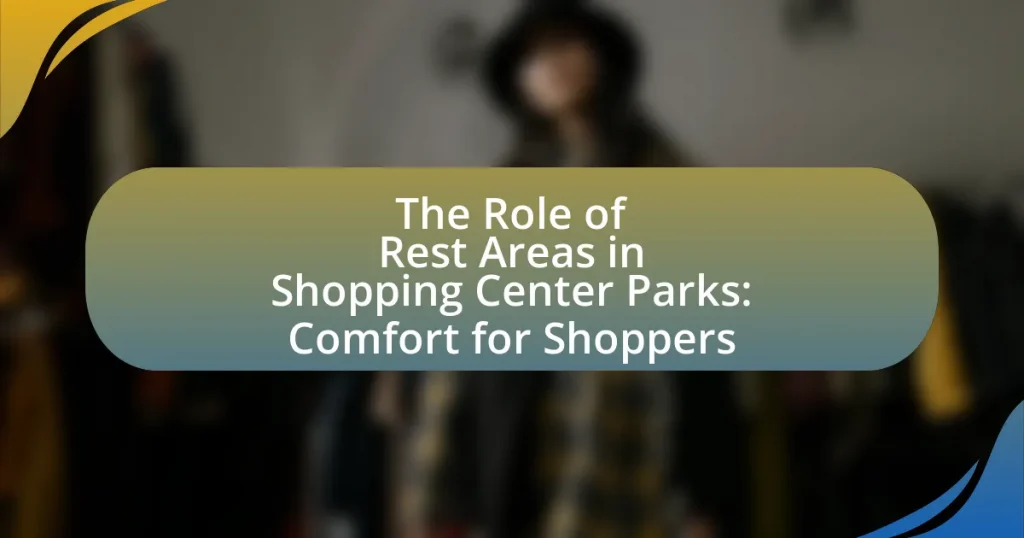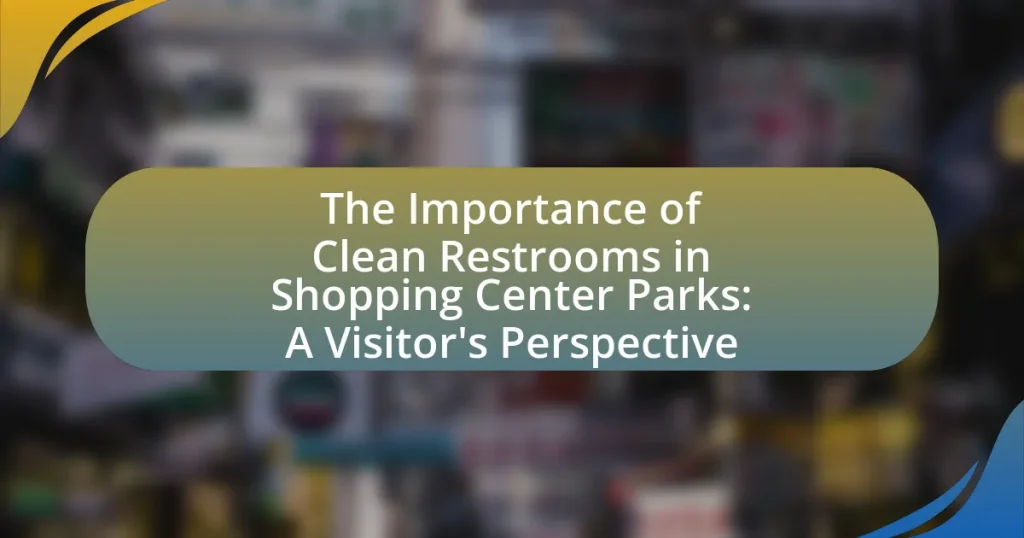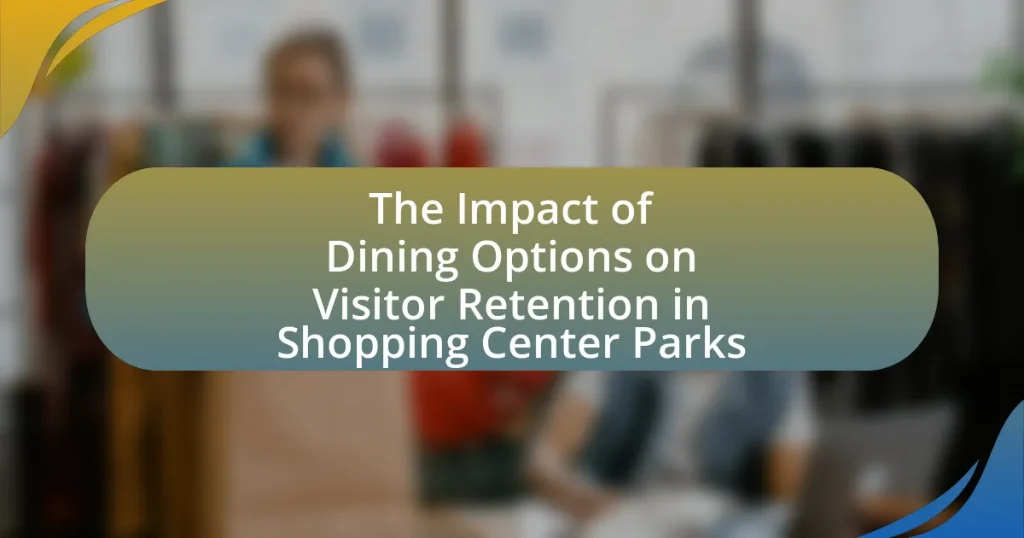The article examines the significant impact of seasonal events on visitor engagement in shopping center parks. It highlights how these events, such as holiday festivals and summer concerts, attract diverse audiences, increase foot traffic by 20-30%, and enhance sales for retailers. The discussion includes the types of seasonal events commonly held, their seasonal variations, and the factors influencing visitor engagement, such as effective marketing and event timing. Additionally, the article outlines best practices for planning and executing successful seasonal events, emphasizing the long-term benefits for shopping centers and local businesses.
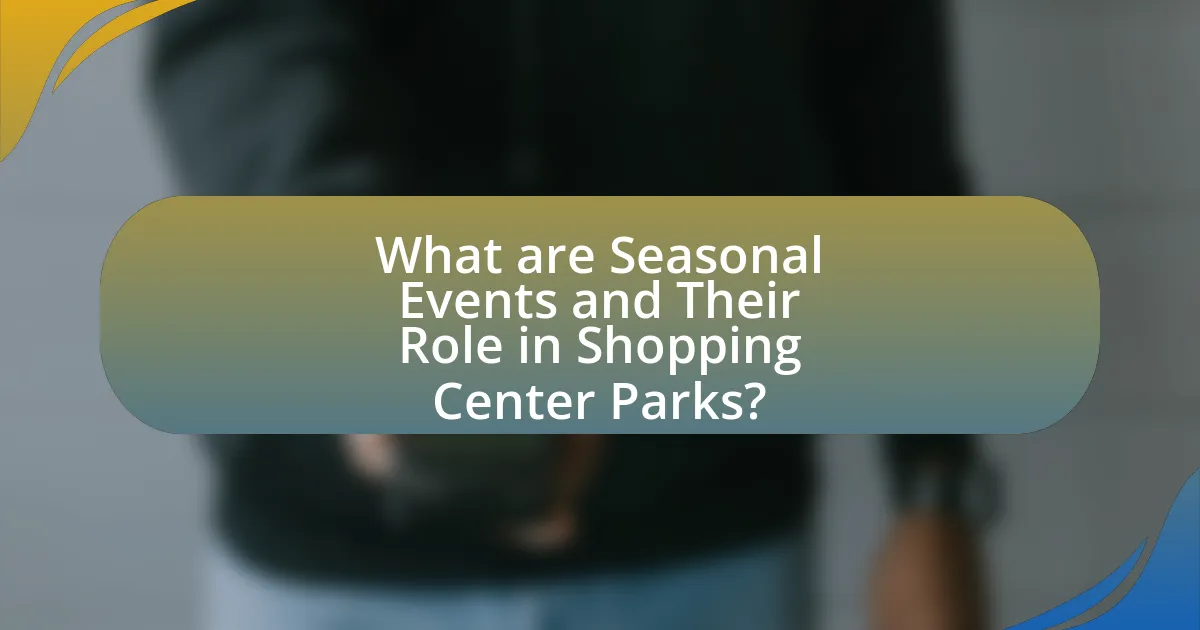
What are Seasonal Events and Their Role in Shopping Center Parks?
Seasonal events are organized activities or celebrations that occur during specific times of the year, such as holidays or seasonal changes, and they play a crucial role in enhancing visitor engagement in shopping center parks. These events attract diverse audiences by offering unique experiences, such as festive decorations, themed entertainment, and special promotions, which can increase foot traffic and sales for retailers. For instance, a study by the International Council of Shopping Centers found that shopping centers that host seasonal events see a 20% increase in visitor numbers compared to those that do not. This demonstrates that seasonal events not only create a vibrant atmosphere but also significantly contribute to the economic vitality of shopping center parks.
How do seasonal events influence visitor engagement in shopping center parks?
Seasonal events significantly enhance visitor engagement in shopping center parks by attracting larger crowds and creating unique experiences. For instance, events like holiday markets, summer concerts, and fall festivals draw in families and individuals seeking entertainment and social interaction. Research indicates that shopping centers that host seasonal events can see a 20-30% increase in foot traffic compared to non-event periods, as these activities provide incentives for visitors to spend time and money in the park. Additionally, seasonal events often encourage repeat visits, as customers associate the shopping center with enjoyable experiences, thereby fostering brand loyalty and community connection.
What types of seasonal events are commonly held in shopping center parks?
Shopping center parks commonly host seasonal events such as holiday festivals, summer concerts, farmers’ markets, and outdoor movie nights. These events are designed to attract visitors and enhance community engagement. For instance, holiday festivals often feature decorations, live entertainment, and activities for families, which can increase foot traffic significantly during peak shopping seasons. Summer concerts provide a platform for local artists and create a vibrant atmosphere, while farmers’ markets promote local produce and foster community connections. Outdoor movie nights offer a unique entertainment option that encourages families to gather, further boosting visitor engagement in these spaces.
How do these events vary by season?
Seasonal events in shopping center parks vary significantly, with each season offering unique themes and activities that attract different visitor demographics. For example, spring events often focus on outdoor activities and floral displays, while summer events may include concerts and family-friendly festivals. In autumn, shopping centers typically host harvest-themed events and Halloween celebrations, and winter events often center around holiday festivities, including Christmas markets and ice skating rinks. Research indicates that these seasonal variations enhance visitor engagement, as they cater to the interests and preferences of the community throughout the year, leading to increased foot traffic and sales during peak seasons.
Why are seasonal events important for shopping center parks?
Seasonal events are important for shopping center parks because they significantly enhance visitor engagement and drive foot traffic. These events create unique experiences that attract diverse audiences, leading to increased sales for retailers and higher overall attendance. For instance, a study by the International Council of Shopping Centers found that shopping centers hosting seasonal events saw a 20% increase in visitor numbers compared to those that did not. This boost in engagement not only benefits the shopping center economically but also fosters a sense of community and encourages repeat visits.
What impact do seasonal events have on foot traffic?
Seasonal events significantly increase foot traffic in shopping center parks. These events attract larger crowds due to their festive nature, promotional activities, and community engagement. For instance, a study by the International Council of Shopping Centers found that shopping centers hosting seasonal events experienced up to a 30% increase in foot traffic compared to non-event periods. This surge is often driven by special promotions, entertainment, and themed activities that draw in both regular visitors and new customers, enhancing overall visitor engagement.
How do seasonal events enhance the overall visitor experience?
Seasonal events enhance the overall visitor experience by creating unique, themed environments that attract diverse audiences and encourage repeat visits. These events often include activities such as festivals, holiday celebrations, and seasonal markets, which provide entertainment and foster a sense of community. For instance, a study by the International Council of Shopping Centers found that shopping centers hosting seasonal events saw a 20% increase in foot traffic compared to those that did not. This increase in engagement not only boosts sales for retailers but also enhances the social experience for visitors, making them more likely to return.
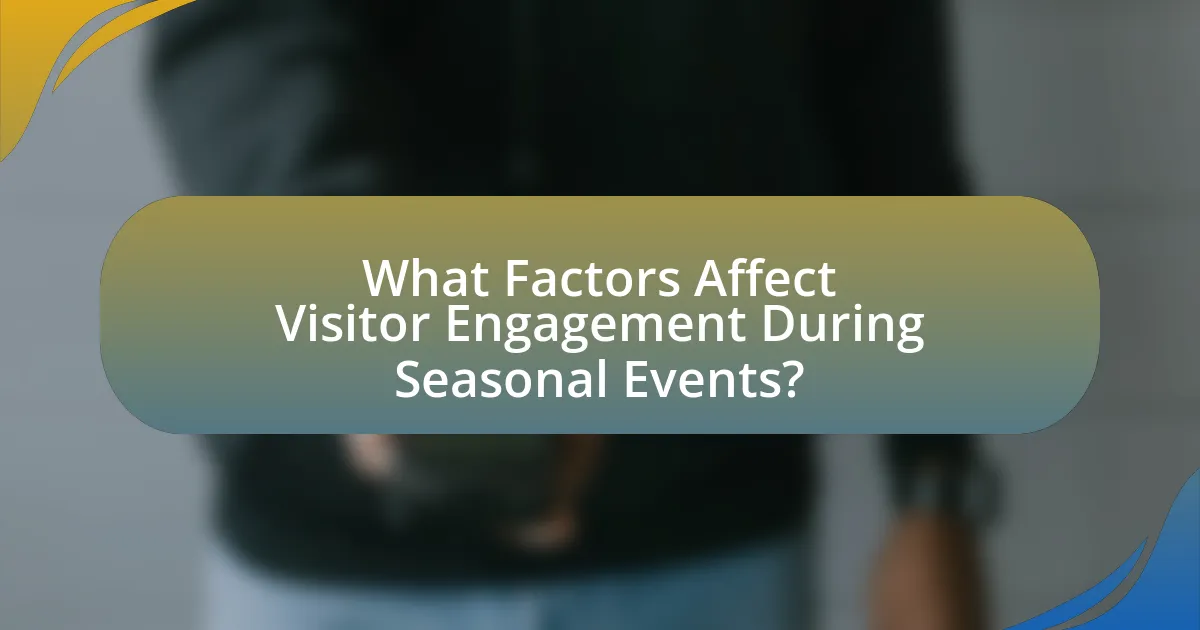
What Factors Affect Visitor Engagement During Seasonal Events?
Visitor engagement during seasonal events is primarily influenced by event relevance, marketing effectiveness, and the overall visitor experience. Event relevance ensures that the activities resonate with the target audience’s interests and seasonal themes, which can significantly enhance participation. For instance, a study by the International Council of Shopping Centers found that 70% of shoppers are more likely to visit a shopping center if seasonal events align with their personal interests.
Marketing effectiveness plays a crucial role in attracting visitors; targeted promotions and social media campaigns can increase awareness and excitement about the event. According to a report by Eventbrite, 78% of event attendees learn about events through social media, highlighting its importance in driving engagement.
Lastly, the overall visitor experience, including amenities, entertainment quality, and accessibility, directly impacts engagement levels. Research from the National Retail Federation indicates that 60% of consumers are likely to return to a shopping center if they have a positive experience during an event. These factors collectively shape visitor engagement during seasonal events in shopping center parks.
How does marketing influence visitor turnout for seasonal events?
Marketing significantly influences visitor turnout for seasonal events by creating awareness and generating interest among potential attendees. Effective marketing strategies, such as targeted advertising, social media promotions, and community engagement, can increase visibility and attract larger crowds. For instance, a study by the Event Marketing Institute found that 84% of event attendees are influenced by social media in their decision to attend, highlighting the importance of digital marketing in driving turnout. Additionally, promotional offers and partnerships with local businesses can enhance the perceived value of attending, further boosting visitor numbers.
What marketing strategies are most effective for promoting seasonal events?
Effective marketing strategies for promoting seasonal events include targeted social media campaigns, email marketing, and partnerships with local businesses. Targeted social media campaigns leverage platforms like Facebook and Instagram to reach specific demographics, increasing event visibility; for instance, 73% of marketers believe that social media marketing has been effective for their business (HubSpot, 2021). Email marketing allows for direct communication with existing customers, providing personalized event information and reminders, which can lead to higher attendance rates. Additionally, partnerships with local businesses can enhance promotional efforts by cross-promoting events, thereby expanding reach and attracting diverse audiences. These strategies collectively enhance visitor engagement and drive attendance at seasonal events in shopping center parks.
How does social media engagement impact visitor numbers?
Social media engagement significantly increases visitor numbers to shopping center parks. When shopping centers actively engage with their audience on platforms like Instagram and Facebook, they create a sense of community and excitement around seasonal events. For instance, a study by the Pew Research Center found that 69% of adults in the U.S. use social media, and businesses that leverage this engagement can see a direct correlation with foot traffic. Specifically, a report from Sprout Social indicates that brands with high engagement rates can experience up to a 20% increase in visitor numbers during promotional events. This demonstrates that effective social media strategies not only enhance brand visibility but also drive actual visits to physical locations.
What role does event timing play in visitor engagement?
Event timing significantly influences visitor engagement by aligning activities with peak attendance periods, thereby maximizing participation. For instance, hosting events during weekends or holidays typically attracts larger crowds, as individuals are more available and willing to engage in leisure activities during these times. Research indicates that shopping centers that strategically schedule seasonal events, such as holiday-themed festivals or summer concerts, experience a notable increase in foot traffic and customer interaction. A study by the International Council of Shopping Centers found that events held during high-traffic periods can boost visitor numbers by up to 30%, demonstrating the critical role of timing in enhancing visitor engagement.
How do holidays and school breaks affect attendance?
Holidays and school breaks significantly increase attendance in shopping center parks. During these periods, families often seek recreational activities, leading to higher foot traffic as parents and children take advantage of time off. For instance, a study by the International Council of Shopping Centers found that shopping centers experience a 20-30% increase in visitor numbers during holiday seasons compared to regular periods. This surge is attributed to special events, promotions, and the overall festive atmosphere that attract more visitors.
What are the best times to schedule seasonal events for maximum engagement?
The best times to schedule seasonal events for maximum engagement are typically during weekends and holidays, particularly in the late afternoon to early evening. Research indicates that consumer foot traffic in shopping centers peaks during these times, with weekends accounting for approximately 40% of total weekly visits. Additionally, aligning events with local holidays or school breaks can significantly enhance participation, as families are more likely to attend when they have free time. For instance, events scheduled around Christmas or Halloween see increased engagement due to the festive atmosphere and community involvement.
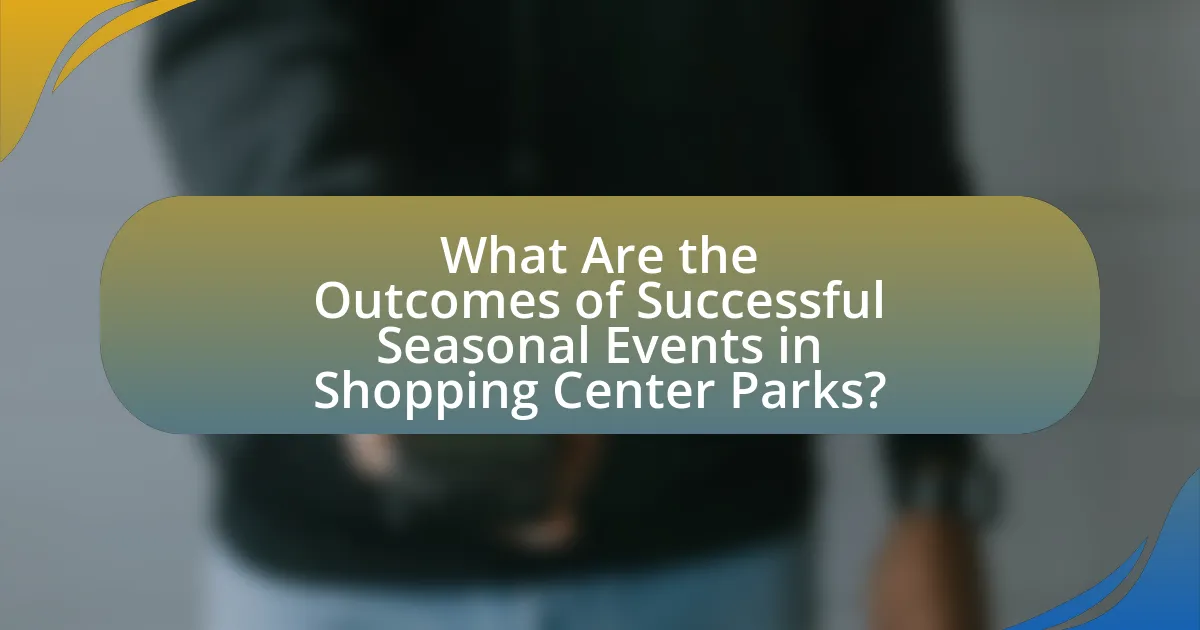
What Are the Outcomes of Successful Seasonal Events in Shopping Center Parks?
Successful seasonal events in shopping center parks lead to increased visitor engagement, higher foot traffic, and enhanced sales for retailers. These events create a festive atmosphere that attracts families and individuals, resulting in a measurable uptick in attendance. For instance, a study by the International Council of Shopping Centers found that shopping centers hosting seasonal events experienced a 20% increase in foot traffic compared to those that did not. Additionally, retailers often report a significant boost in sales during these events, with some noting increases of up to 30%. This correlation between seasonal events and economic performance underscores the effectiveness of such initiatives in driving consumer behavior and enhancing the overall shopping experience.
How do successful seasonal events contribute to revenue generation?
Successful seasonal events significantly contribute to revenue generation by attracting increased foot traffic and enhancing customer spending. These events create a unique shopping experience that encourages visitors to engage with retailers, leading to higher sales volumes. For instance, a study by the International Council of Shopping Centers found that shopping centers hosting seasonal events saw a 20% increase in foot traffic compared to those that did not. Additionally, seasonal events often include promotions and special offers, which incentivize purchases and boost overall revenue. This combination of increased visitor engagement and targeted marketing strategies during seasonal events directly correlates with enhanced financial performance for shopping center parks.
What sales trends are observed during and after seasonal events?
Sales trends during and after seasonal events typically show a significant increase in consumer spending, particularly in retail and hospitality sectors. For instance, during holiday seasons like Christmas, sales can surge by as much as 20-30% compared to non-holiday periods, driven by promotional activities and consumer behavior focused on gift-giving. After these events, a notable decline in sales often occurs, as consumers shift from holiday spending to post-holiday budgeting, with January often seeing a drop of 10-15% in retail sales. This pattern is supported by data from the National Retail Federation, which indicates that seasonal events create spikes in foot traffic and sales, followed by a normalization period.
How do seasonal events impact local businesses within shopping center parks?
Seasonal events significantly boost local businesses within shopping center parks by increasing foot traffic and enhancing customer engagement. For instance, during holiday seasons, shopping center parks often host events such as festivals, markets, or themed activities that attract larger crowds. According to a study by the International Council of Shopping Centers, shopping centers that host seasonal events can see a 20-30% increase in sales for participating retailers. This surge in visitors not only drives immediate sales but also fosters brand loyalty and encourages repeat visits, ultimately benefiting the overall economic health of local businesses.
What are the long-term benefits of hosting seasonal events?
Hosting seasonal events provides long-term benefits such as increased customer loyalty, enhanced brand visibility, and sustained foot traffic. These events create memorable experiences that encourage repeat visits, fostering a sense of community and attachment to the shopping center park. For instance, a study by the International Council of Shopping Centers found that 70% of consumers are more likely to return to a shopping center that hosts events, indicating a direct correlation between event hosting and customer retention. Additionally, seasonal events can attract new visitors, expanding the customer base and increasing overall sales. By consistently engaging the community through these events, shopping center parks can establish themselves as vibrant social hubs, leading to long-term economic benefits.
How do seasonal events foster community relationships?
Seasonal events foster community relationships by providing opportunities for social interaction and collaboration among residents. These events, such as festivals, holiday celebrations, and farmers’ markets, create a shared experience that encourages community members to engage with one another, strengthening social bonds. Research indicates that participation in community events can lead to increased trust and cooperation among residents, as evidenced by a study published in the Journal of Community Psychology, which found that communities with regular events reported higher levels of social cohesion and collective efficacy. By bringing people together in a festive atmosphere, seasonal events enhance community identity and promote a sense of belonging.
What strategies can be implemented to ensure ongoing visitor engagement?
To ensure ongoing visitor engagement in shopping center parks, implementing a mix of interactive events, loyalty programs, and personalized marketing strategies is essential. Interactive events, such as seasonal festivals or themed activities, create memorable experiences that encourage repeat visits. For instance, a study by the International Council of Shopping Centers found that 70% of shoppers are more likely to return to a center that hosts regular events.
Loyalty programs incentivize repeat visits by offering rewards for frequent shoppers, which can increase customer retention rates. According to a report by Bond Brand Loyalty, 79% of consumers are more likely to continue doing business with brands that offer loyalty programs.
Personalized marketing, utilizing data analytics to tailor promotions and communications to individual preferences, enhances visitor engagement by making interactions more relevant. Research from McKinsey & Company indicates that personalized experiences can lead to a 10-15% increase in customer engagement.
By combining these strategies, shopping center parks can effectively maintain visitor interest and drive ongoing engagement.
What Best Practices Can Shopping Center Parks Implement for Seasonal Events?
Shopping center parks can implement several best practices for seasonal events to enhance visitor engagement. First, they should create themed events that align with seasonal holidays, such as winter festivals or summer fairs, which attract diverse audiences. Research indicates that themed events can increase foot traffic by up to 30%, as they create a unique experience that draws in visitors.
Additionally, shopping center parks should collaborate with local businesses and artists to provide entertainment and food options, fostering community involvement and enhancing the overall experience. This collaboration can lead to increased sales for local vendors and a more vibrant atmosphere, which is crucial for visitor retention.
Effective marketing strategies, including social media promotions and targeted advertising, are essential for reaching potential visitors. Statistics show that 70% of consumers are influenced by social media when deciding to attend events, making it a vital tool for engagement.
Finally, gathering feedback through surveys post-event can help shopping center parks refine their offerings and better meet visitor expectations in future seasonal events. This practice not only improves future events but also demonstrates that the park values visitor input, fostering a sense of community and loyalty.
How can shopping center parks effectively plan and execute seasonal events?
Shopping center parks can effectively plan and execute seasonal events by conducting thorough market research to understand visitor preferences and trends. This research enables them to tailor events that resonate with their target audience, increasing engagement. For instance, data from the International Council of Shopping Centers indicates that seasonal events can boost foot traffic by up to 30%, demonstrating their effectiveness in attracting visitors. Additionally, collaboration with local businesses and community organizations can enhance event offerings and promote cross-promotion, further driving attendance. Implementing a structured timeline for planning, marketing, and execution ensures that all logistical aspects are addressed, leading to a successful event.
What are the key elements of a successful seasonal event strategy?
The key elements of a successful seasonal event strategy include clear objectives, targeted marketing, engaging programming, effective partnerships, and thorough evaluation. Clear objectives define the purpose and desired outcomes of the event, ensuring alignment with overall business goals. Targeted marketing reaches the intended audience through appropriate channels, maximizing attendance and engagement. Engaging programming offers activities that resonate with visitors, enhancing their experience and encouraging repeat visits. Effective partnerships with local businesses and organizations can provide additional resources and broaden outreach. Finally, thorough evaluation assesses the event’s success against the established objectives, allowing for continuous improvement in future strategies. These elements collectively contribute to increased visitor engagement in shopping center parks during seasonal events.
